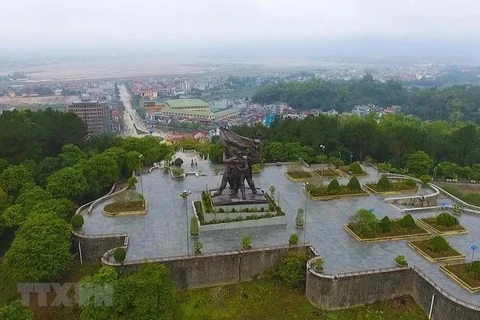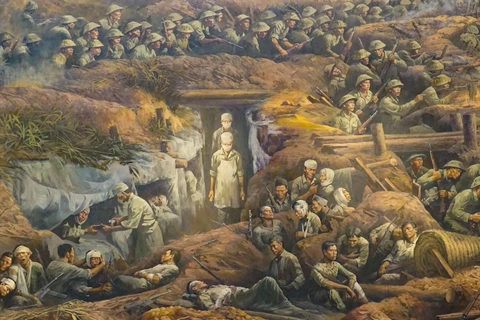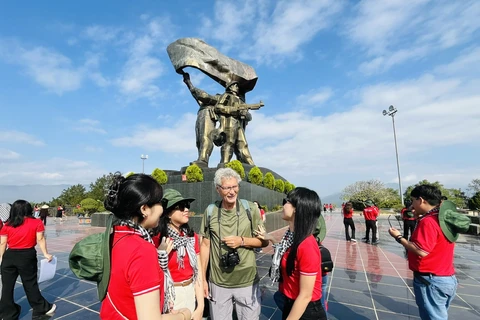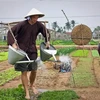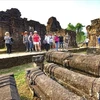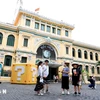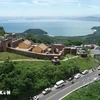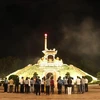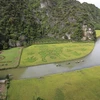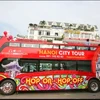Dien Bien (VNA) - In 2024, the National Tourism Year will unfold under the theme “Glorious Dien Bien- Infinite Experiences" featuring 169 diverse programs and events across multiple provinces and cities throughout Vietnam.
The announcement was made by the Ministry of Culture, Sports, and Tourism in conjunction with the People's Committee of Dien Bien province during a press conference held in Hanoi on February 21.
Deputy Minister of Culture, Sports, and Tourism Trinh Thi Thuy highlighted the initiative's aim to foster connectivity and drive tourism development between Dien Bien province and the Northwest localities, as well as other regions. The ultimate goal is to elevate tourism into a leading economic sector while enhancing the image, position, and branding of Vietnamese tourism both domestically and internationally.
The Ministry chose Dien Bien province as the venue for the 2024 National Tourism Year, embracing the theme "Glory of Dien Bien Phu - Endless Experiences" to achieve these objectives.
"We are confident that the National Tourism Year - Dien Bien 2024 will bring together and showcase the unique values and potential of Dien Bien's tourism, the Northwest region, and Vietnam as a whole. This event aims to contribute towards transforming tourism into a cornerstone economic sector," Thuy stated.
According to Deputy Chairman of Dien Bien province People's Committee Vua A Bằng, the province hopes to welcome 1.3 million tourists this year, reaching a total tourism revenue of around 2.2 trillion VND (95.65 million USD).
Dien Bien achieved the milestone of welcoming over one million tourists for the first time last year, an increase of nearly 25 per cent compared to the figure of 2022, reaching 107 per cent of the annual plan. International tourists reached 7,500.
The organisation of the National Tourism Year will also be a significant boost for socioeconomic development and for the tourism sector of Dien Bien Province in particular, he added.
It will create conditions to attract investment resources for development, build new and attractive products and generate momentum for economic development of the province in 2024 and the following years.
The highlight of the National Tourism Year is the opening ceremony, combined with the Ban Flower Festival 2024 that is themed Returning to the Land of Ban Flowers, scheduled to take place on March 16 at the 7-5 Square in Dien Bien Phu City.
 Ban flowers have become the symbol of the Northwest region in general and Dien Bien province in particular. (Photo: Vietnam+)
Ban flowers have become the symbol of the Northwest region in general and Dien Bien province in particular. (Photo: Vietnam+) During this time, tourists will have the opportunity to admire the white ban (Bauhinia) blossoms blooming in the mountainous forests and explore the distinctive cultures of the ethnic groups in Dien Bien by participating in Thái ethnic traditional dance performances and H’mong ethnic art events.
Many activities commemorating the 70th anniversary of the Dien Bien Phu Victory will be organised during May, including special arts programmes and high-altitude fireworks displays, as well as the commemoration ceremony of victory.
In August, tourists and travel businesses will be connected at the Northwest – Dien Bien Tourism Fair, the National Cuisine Festival, and many other festivities.
Visitors to this year’s National Tourism Year can also contemplate local tourist attractions and scenery like Muong Thanh rice fields, the Tua Chua stone plateau, Pha Din Pass or the border landmark at the A Pa Chai tri-border junction.
There are three flights to Dien Bien every day, two flights from Hanoi and one from HCM City. Tourists from Hanoi can also choose to travel to Dien Bien by coach or private car.
Located about 320km from Hanoi, Dien Bien mountainous province boasts favourable natural conditions, friendly and hospitable people and a diverse cultural identity. It is home to 19 ethnic groups, including the H’mong, Thai, Dao, Ha Nhi, and Lao, and is famed worldwide for the glorious Dien Bien Phu Victory in 1954.
The province has 33 ranked historical sites, including one particularly significant national historical site, the Dien Bien Phu Battlefield. Additionally, it has 18 recognised intangible cultural heritage elements, among which Thai traditional dance and the Tay, Nung, and Thai people's practice of then singing have been inscribed by UNESCO as representative intangible cultural heritage of humanity./.


